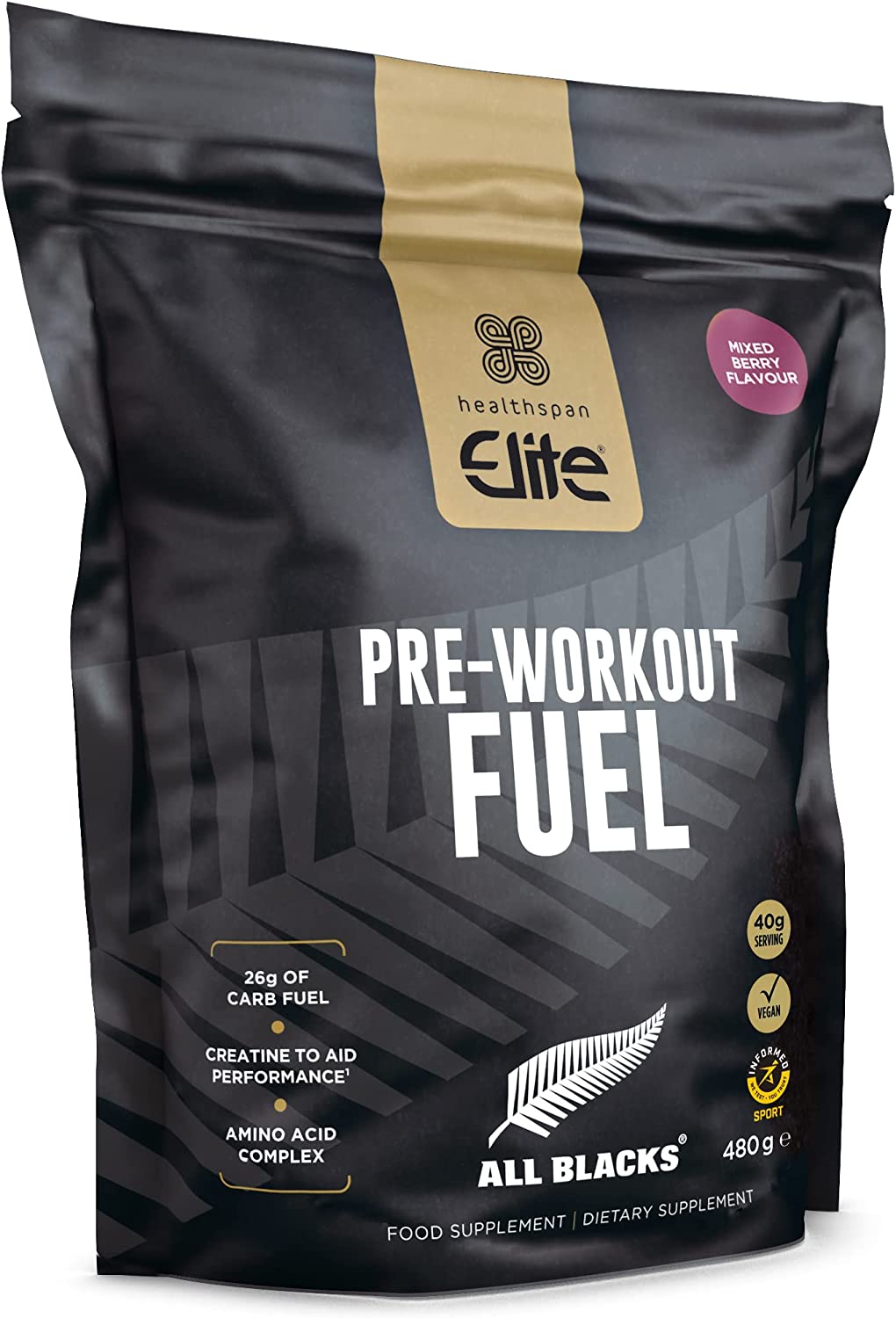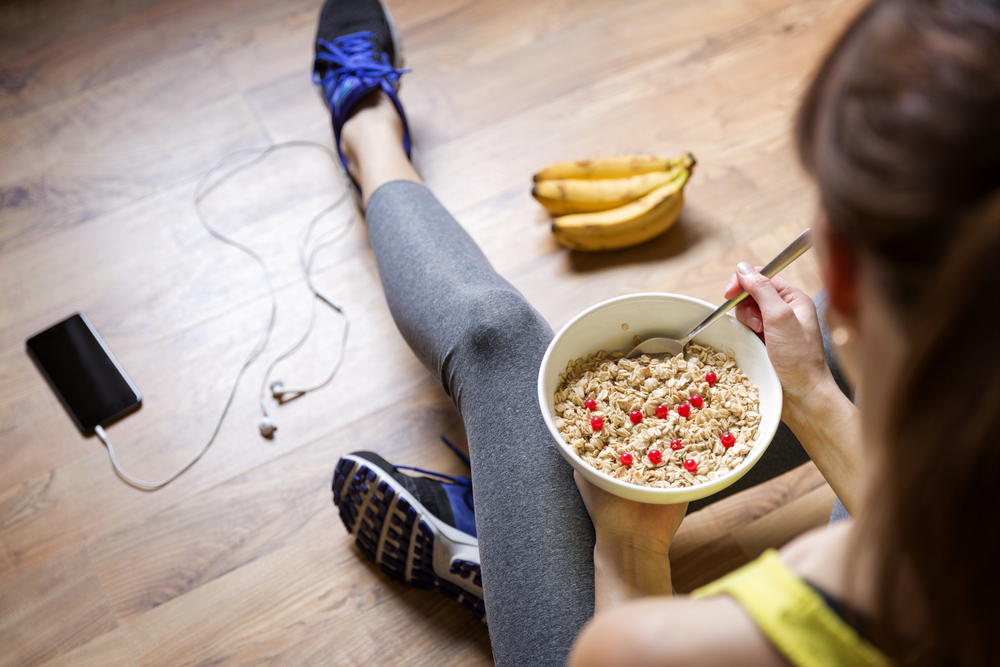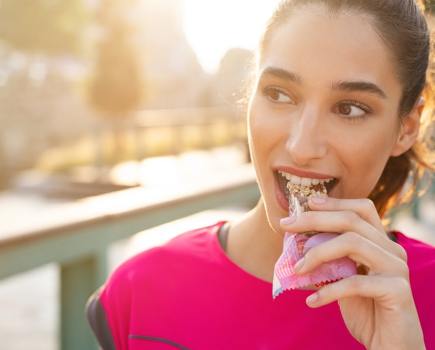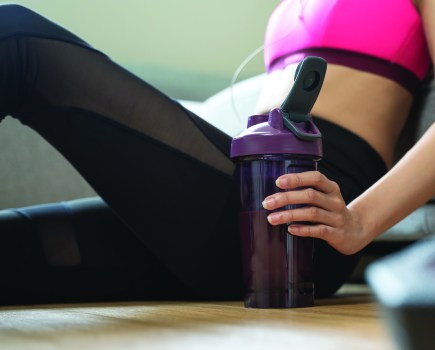What should you eat before a workout – and when? Is carbohydrate, fat or protein best? Nutritionist Christine Bailey is here with everything you need to know about pre-workout nutrition for women…
Whether you’re a regular at the gym or fairly new to fitness, you’ll want to get the most out of your workout. But advice on what to eat before a workout varies tremendously, with some people preferring fasted workouts while others stress about the exact quantities of protein and carbs they consume. So how important is pre-workout nutrition for women? Nutritionist Christine Bailey looks at what you should be eating before a workout.
Curious about post-workout nutrition? Discover what to eat after exercising
Whatever your fitness goals, what and when you eat can make a difference to both your performance and recovery. Our bodies require fuel and nutrition during and after training. The type of fuel you choose (fats, protein or carbohydrates) can equally make a difference to how well you perform. So what is right for you?
Firstly, remember that exercise is essentially a catabolic process; workouts break down muscle tissue and the repair, recovery and growth occurs after your workout (hence the reason why the old phrase ‘you don’t build muscle in the gym’ is true). Exercise also depletes stored glycogen, electrolytes and other nutrients, depending on the length and intensity of the exercise. So the goal of any pre-workout meal is to sustain energy, boost performance, hydrate, preserve muscle and speed up recovery.
Power up with the Healthspan All Black Pre-workout Fuel
BUY IT NOW:
£23.99 / amazon.co.uk

Related content:
- Your guide to pre-workout supplements
- How to warm up for exercise: 10 minute routine
- Benefits of acupressure for post-workout recovery

Pre-workout nutrition for different types of exercise
Whether you will benefit from a specific pre-workout meal depends on a number of factors, including the type, intensity and duration of your exercise, when you last ate and your overall diet. No amount of pre- workout supplements will transform your physique or performance, especially if you haven’t got the basics of your diet right first.
The truth is, what is best for you is very dependent on your individual needs and type of training. There is no one-size-fits-all. This means you need to view any pre-workout fuel in the context of your diet on the whole. It takes around two to three hours prior to exercise to fully digest your meal and use that energy. So if you’ve recently eaten, a specific pre-workout meal may not be necessary. Some people also find eating too soon before training can lead to digestive issues.
There are times when a pre-workout meal can be beneficial. This includes people who train multiple times a day or are training for more than a couple of hours at a time. The intensity and duration of such exercise will significantly deplete energy reserves, making your pre- and post-workout meals much more important. Equally, if you are looking to build muscle or are low in energy, then the right pre-workout fuel may give you a boost.
Should I eat protein before exercising?
If you haven’t eaten protein in the three hours or so before your workout, then including some protein in your pre-workout snack can be helpful. By including protein, you enhance muscle protein synthesis and reduce breakdown rates, which means it can help protect lean muscle mass.
Ensuring sufficient protein through the day will also support muscle growth and assist in recovery after training, so remember it’s not just about that pre-workout snack – your whole diet needs to support your fitness goals.
Should I eat carbs before exercising?
Whether you’re going to the gym or heading out for a run, including some carbohydrates can boost performance. Carbohydrates are the body’s quickest source of fuel. For lifting sessions, endurance and explosive exercise (e.g HIIT training, Cross Fit, etc), eating carbs before training provides your body with an abundance of glucose to burn for immediate energy.
With sufficient glucose, you’ll find workouts easier both mentally and physically. Topping up carbs also helps to preserve the glycogen stored in your muscles (a type of stored carbohydrate in the body), which can help with long workouts or endurance exercise (like running or cycling), avoiding any dips in performance.
Your choice of carbs will depend on when you are eating and the type of workout. Quick-releasing carbs come from simple sugars that are digested rapidly, giving you an immediate burst of energy. Fruit juice, energy gels, honey and dried fruit are good examples. Slow carbs are those found in starchy, fibre-rich foods that tend to take longer to digest. These are particularly useful for when you want more sustained energy. Examples include oats, potatoes, wholegrain crackers and brown rice.
Should I eat fats before exercising?
While fat is a useful energy source, particularly for endurance exercise like running, road cycling and swimming, the majority of fat burned during training tends to come from our stored fat rather than the pre-workout meal.
The exception is when endurance athletes are training in a ketogenic state and make use of supplements containing medium-chain triglycerides. These are unique fats that are absorbed from the digestive tract more quickly than other fats and for endurance, slow steady state exercise can improve performance. As fat takes a while to digest, some people find too much fat in their pre-workout meal can make them feel nauseous.

Pre-workout nutrition for women: what to eat before exercise
Not sure what to eat? Here are some tips…
Pre-workout nutrition for women if you’re doing a gym session…
If you are working out first thing in the morning, you’re unlikely to have time to digest food prior to training. For early morning workouts, many people prefer fasted training. However, if you do feel a little sluggish, having a coffee or a liquid source of energy 30 minutes before training may give you a much-needed boost. Gym sessions often combine weight training and cardio, so if you haven’t eaten for a couple of hours try a light snack combining protein and easy-to-digest carbs about one hour before training. The closer your exercise session, the lighter the food should be, to avoid digestive upsets.
- Low-fat fruit smoothie
- Low-fat chocolate milk
- Greek yogurt and banana
- Cereal bar
- Energy balls
- Rice cakes with nut butter
Pre-workout nutrition for women if you’re doing HIIT training…
When performing at high intensity, your body is burning mostly carbs for energy as well as a little fat. If you sweat a lot, think about your fluid intake. Fatigue during workouts can be linked to insufficient fluids. About 30 minutes before your workout, consume some quick-releasing carbs for energy. Keep fibre low and fat low.
- Fruit juice or pre- workout drink
- Dried fruit (e.g. dates, raisins)
- Banana
- Coconut water
Pre-workout nutrition for women if you’re doing a long run or cycle…
Depending on the length and timing of your training, aim to consume a combination of slow-releasing carbohydrates (e.g. oats) and quicker releasing energy (e.g. fruit) at least one hour before exercise. This will help raise your blood sugar, and top up muscle and liver carbohydrate stores to provide lasting energy for the duration of your training. Include some protein, too – this can help stabilise blood sugar levels and reduce muscle breakdown. If you find any amount of food gives you digestive troubles, try a low-fat smoothie or pre-workout drink instead.
- Porridge with peanut butter and banana
- Greek yogurt with berries
- Pretzels and a handful of raisins
- Protein fruit smoothie
- Cereal bar
Pre-workout nutrition for women if you’re doing a weights session…
If it has been a few hours since you last ate a meal, then include a combination of protein and carbs 30 to 60 minutes prior to a session. When it comes to muscle building, consuming sufficient protein prior to training can help reduce the rate of muscle breakdown. This helps reduce the damage to your muscles and improves your rate of recovery. Adding in some carbs 30 to 60 minutes before working out will help you push harder in your training and may aid recovery.
- Protein shake and fruit
- Chocolate milkshake
- Porridge with a scoop of protein powder
- Protein bar
- Cottage cheese with fruit
- Rice cakes with ham
- Low-fat Greek yogurt, peanut butter and raisins
Words: Christine Bailey | Images: Shutterstock
Head over to Men’s Fitness UK to discover how often you should eat to build muscle.








